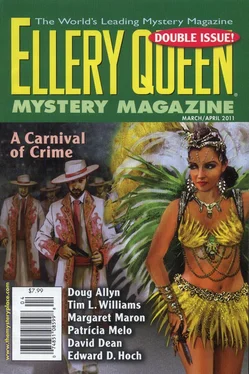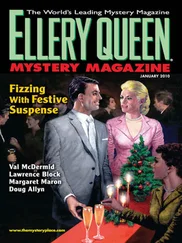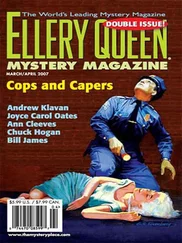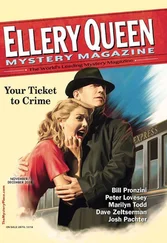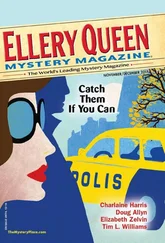Doug Allyn - Ellery Queen’s Mystery Magazine. Vol. 137, No. 3 & 4. Whole No. 835 & 836, March/April 2011
Здесь есть возможность читать онлайн «Doug Allyn - Ellery Queen’s Mystery Magazine. Vol. 137, No. 3 & 4. Whole No. 835 & 836, March/April 2011» весь текст электронной книги совершенно бесплатно (целиком полную версию без сокращений). В некоторых случаях можно слушать аудио, скачать через торрент в формате fb2 и присутствует краткое содержание. Город: New York, Год выпуска: 2011, ISBN: 2011, Издательство: Dell Magazines, Жанр: Детектив, на английском языке. Описание произведения, (предисловие) а так же отзывы посетителей доступны на портале библиотеки ЛибКат.
- Название:Ellery Queen’s Mystery Magazine. Vol. 137, No. 3 & 4. Whole No. 835 & 836, March/April 2011
- Автор:
- Издательство:Dell Magazines
- Жанр:
- Год:2011
- Город:New York
- ISBN:ISSN 0013-6328
- Рейтинг книги:5 / 5. Голосов: 1
-
Избранное:Добавить в избранное
- Отзывы:
-
Ваша оценка:
- 100
- 1
- 2
- 3
- 4
- 5
Ellery Queen’s Mystery Magazine. Vol. 137, No. 3 & 4. Whole No. 835 & 836, March/April 2011: краткое содержание, описание и аннотация
Предлагаем к чтению аннотацию, описание, краткое содержание или предисловие (зависит от того, что написал сам автор книги «Ellery Queen’s Mystery Magazine. Vol. 137, No. 3 & 4. Whole No. 835 & 836, March/April 2011»). Если вы не нашли необходимую информацию о книге — напишите в комментариях, мы постараемся отыскать её.
Ellery Queen’s Mystery Magazine. Vol. 137, No. 3 & 4. Whole No. 835 & 836, March/April 2011 — читать онлайн бесплатно полную книгу (весь текст) целиком
Ниже представлен текст книги, разбитый по страницам. Система сохранения места последней прочитанной страницы, позволяет с удобством читать онлайн бесплатно книгу «Ellery Queen’s Mystery Magazine. Vol. 137, No. 3 & 4. Whole No. 835 & 836, March/April 2011», без необходимости каждый раз заново искать на чём Вы остановились. Поставьте закладку, и сможете в любой момент перейти на страницу, на которой закончили чтение.
Интервал:
Закладка:
“You haven’t collected it?”
“Well, we’d want the police with us anyway if he has put the half-million pounds in the left luggage at York station. We wouldn’t be happy walking through York with a bundle like that.”
“I can imagine. So, shall we go and see what he has left us? I can arrange for a number of constables to bolster our numbers.”
“I’d appreciate it.”
Hennessey and Penge rendezvoused with three constables at York Railway Station’s left-luggage office and presented the receipt. In return, they were handed two large suitcases. Neither was locked and when opened, both were observed to contain large quantities of bank notes.
“We’ll escort you back to the bank with this,” Hennessey said. “A police vehicle and a couple of constables.”
“Appreciate it,” Penge had said. “It’s all going to be there. All half a million. Poor Tom... I know why he killed himself... He couldn’t live with himself after doing this. But why, why did he do it in the first place?”
“I’d like to know that too,” Hennessey had said.
By this point in his recollection, Olivia Stringer was about halfway through the glass of port and was staring into space, chatting quite amicably with herself. Hennessey couldn’t remember who supplied the name, Mr. Penge, or Mrs. Webster, or one of the bank staff. Hennessey couldn’t even remember the name, but it was the name of a man who was of Webster’s age and he and Webster were described as being “like brothers.” Hennessey met him the day after Webster’s suicide, by which time the man had heard the news and was in a state of shock. They sat together on solid wooden garden furniture in the pleasingly mature garden at the rear of the man’s house in Nether Poppleton, where, beyond the garden, was a pleasant view across the meadows to the River Ouse.
“I should have seen it coming,” the man said. “All those signals, clear as daylight in hindsight.”
“Tell me.”
“Well, it started, or stopped, whichever way you look at it, after the birth of their second child. After that, Mrs. Webster moved into the spare room. ‘He’s got two children, no further point in sleeping together.’”
“She said that?”
“Yes, in this house. Tom didn’t know where to put himself.”
“A man wants more than that.”
“Of course he does, and a woman, too, but not Mrs. Webster. From that point onwards, her idea of keeping romance alive in her marriage was walking arm in arm with her husband to and from the ten o’clock service. So long as it all looked right, the reality didn’t matter. And he stuck it, too, for fifteen years, more, he put up with that charade. Then, maybe it was because he’d finally snapped, maybe it was because he’d found himself in a mid-life crisis, he told me that he’d found a ‘girl.’”
“A girl?”
“That was what he said. He was delighted, he could not contain his excitement, he was like an adolescent with his first real girlfriend. It was all a bit embarrassing. That was about three months ago.”
“Did he mention her name?” Hennessey remembered that he had asked that question.
“Olivia. Never told me her second name. She’s about thirty, that puts her twenty years his junior. Didn’t like the sound of her, really, seemed a bit of a good-time girl, not Thomson’s type at all. Then, earlier on this week he phoned me. He said, ‘I’ve ruined my life,’ and then he put the phone down. I phoned him at work, then at his home, he wasn’t at either place. He was nowhere to be found.”
Hennessey watched Olivia Stringer drain the glass and then look disappointed and lost. She stared at the glass as if willing it to refill as if by magic. He remembered meeting her for the first time.
“My boyfriend pays for it,” she said, smiling. Designer clothes, designer jewellery. “This flat, it’s rented, as is, furnished, but my boyfriend pays for it all. Well, he’s older than me, a bit of a sugar daddy, I suppose, and I’m his sugar baby.”
“I see,” Hennessey growled disapprovingly.
“Men do what I want them to do,” she said, twirling her figure. “I can make men do anything.”
“Can you?”
“Oh, yes. I’m thirty, have to start thinking about settling down, so I told my sugar daddy that if he got some serious money I’d go away with him and we’d settle down together. Anyway, how did you find me? And what do you want?”
So Hennessey had told her that her name had been found in her “sugar daddy’s” address book. He also told her that just that day previous said “sugar daddy” had stood on a railway line and said thank you to the driver of the train a second before the impact despatched Sugar Daddy to the hereafter.
And that, Hennessey mused, as he drained his glass of tonic water, was the first part of his story.
The second part of the story occurred some ten years later when George Hennessey and his son Charles, by then a student, had whiled away a winter’s evening by burning fagots in the hearth in the living room of their home in Easingwold and “jawing.” George Hennessey’s dear wife, and dear mother to Charles, had died sadly young some years earlier but had left a strong and warm ghost in the house and garden, and father and son had bonded in her absence. It had grown to be George Hennessey’s practice to tell his son of cases he had been involved in, never compromising his professionalism by naming names or cheapening their jaw sessions by relating salacious or sensational incidents, but rather choosing incidents which offered his growing son some insight into the human condition. The story of the man who took his hat off to the train driver was one such, and he had related the story one evening as the dried twigs crackled and flamed in the fireplace.
The third part of the story was a wholly unexpected exchange between Olivia Stringer and George Hennessey. That lunchtime an emaciated Olivia Stringer, focusing her eyes on Hennessey as the only other customer in the pub, had staggered over to him and said, “Can you buy me a drink, sir? I’m down on my luck, sir.”
Hennessey had stood and said, “No, Olivia, I can’t,” and had walked away, out of the Waggoners’ Rest, feeling Olivia Stringer’s eyes burning into him, wondering who he was and how he knew her name.
Copyright © 2011 by Peter Turnbull
Lie Like a Rug
by Margaret Maron
Margaret Maron is the winner of several major American mystery awards: the Edgar, Agatha, Anthony, and Macavity. She is the author of twenty-five novels and the New York Times has said: “Every Margaret Maron is a celebration of something remarkable.” The sixteenth entry in her Judge Deborah Knott series, Christmas Mourning (11/10) is no exception. Readers who crave more of the author’s short fiction should check out her podcast of her story “Virgo in Sapphires” (www.themysteryplace.com/eqmm).
One of the last to see Felicia Hernandez Parker before she disappeared from her home near Raleigh was a woman who came by to deliver a bushel of tomatoes that Mack Parker had bought at her roadside vegetable stand on his way to work that morning. She was a stranger to both Parkers and when the case came to trial, her testimony was dispassionate and objective.
“I saw her black eye when she came out to the truck to get the tomatoes. She asked me how to can them. She’d never canned anything before, but her husband wanted tomato vegetable soup like his mother makes. I suggested that she call her mother-in-law and ask her, but she said that her husband wouldn’t have anything to do with his family. They didn’t approve of the marriage and he wasn’t one to take criticism.”
“Objection!” said the defense attorney. “Hearsay.”
Читать дальшеИнтервал:
Закладка:
Похожие книги на «Ellery Queen’s Mystery Magazine. Vol. 137, No. 3 & 4. Whole No. 835 & 836, March/April 2011»
Представляем Вашему вниманию похожие книги на «Ellery Queen’s Mystery Magazine. Vol. 137, No. 3 & 4. Whole No. 835 & 836, March/April 2011» списком для выбора. Мы отобрали схожую по названию и смыслу литературу в надежде предоставить читателям больше вариантов отыскать новые, интересные, ещё непрочитанные произведения.
Обсуждение, отзывы о книге «Ellery Queen’s Mystery Magazine. Vol. 137, No. 3 & 4. Whole No. 835 & 836, March/April 2011» и просто собственные мнения читателей. Оставьте ваши комментарии, напишите, что Вы думаете о произведении, его смысле или главных героях. Укажите что конкретно понравилось, а что нет, и почему Вы так считаете.
